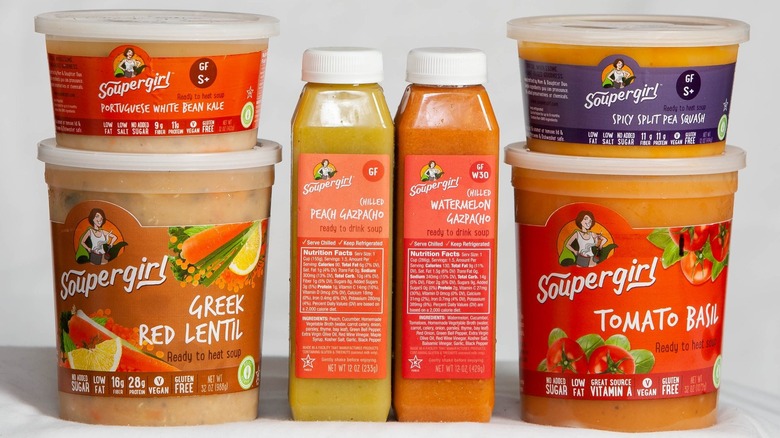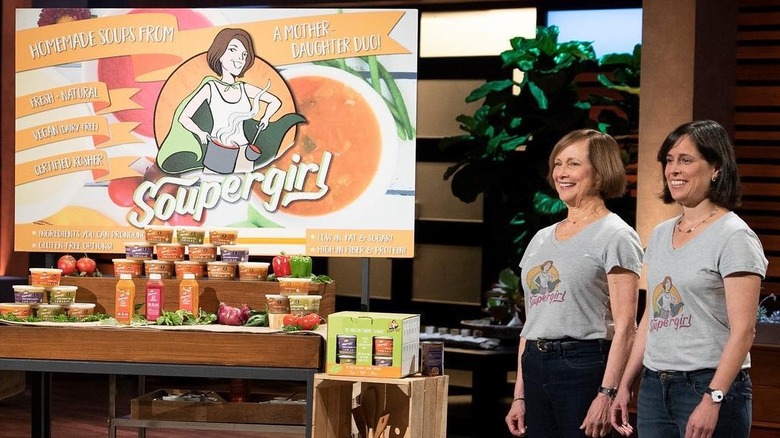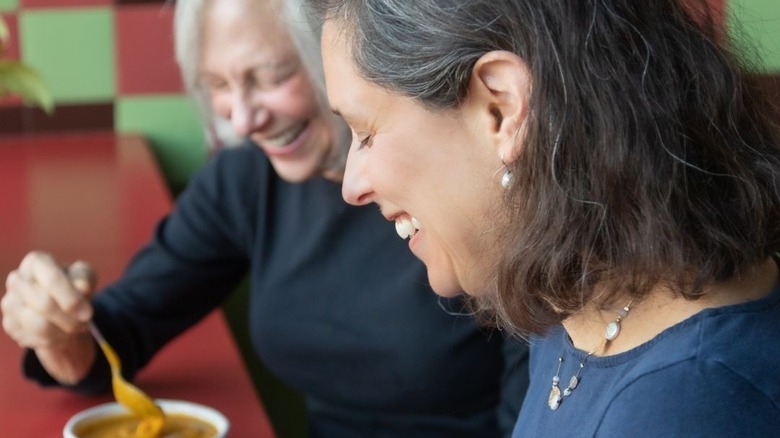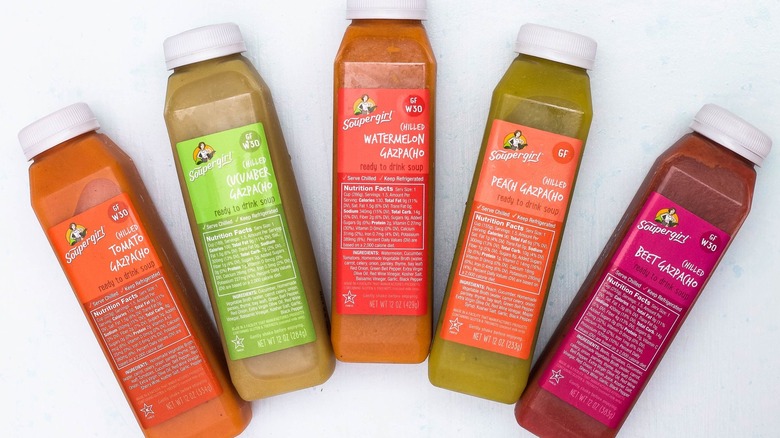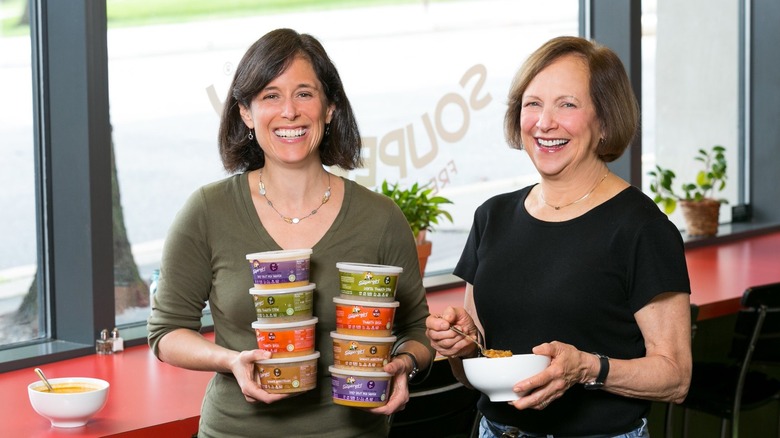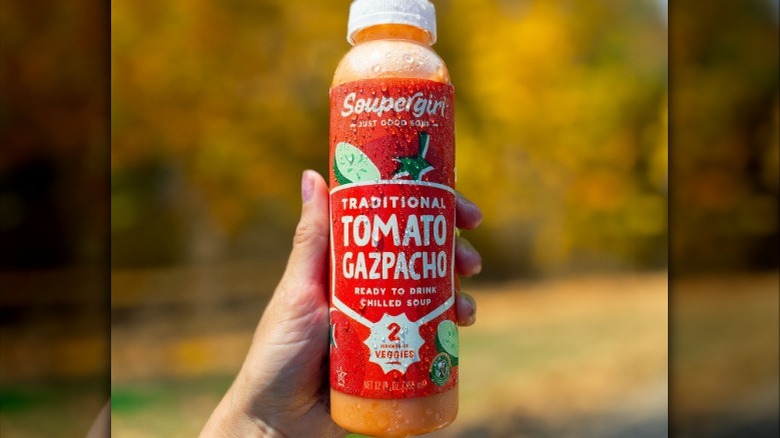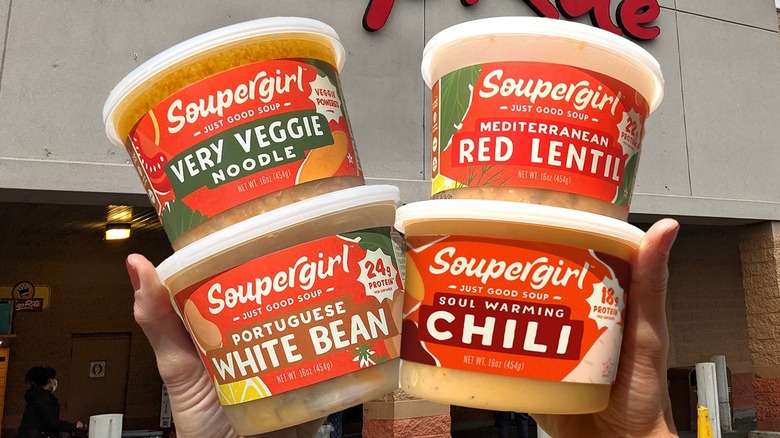Soupergirl: Here's What Happened After Shark Tank
Sara Polon wanted to find a ready-made soup that was vegan, healthy, low in fat and sodium — and she wanted it to be sustainably and ethically produced. But she couldn't find even one brand that was both satisfying and aligned with her values. After learning about injustice and exploitation in the way industrialized foods are produced, Polon couldn't ignore those issues any longer, so she decided to start her own soup company — one that would make solving these problems its focus and mission — along with making very tasty, nutritious soup.
As a former stand-up comedian, Sara Polon realized that while she had vision, she lacked the cooking chops. She persuaded her mother, Marilyn Polon, to come out of retirement and join her in the kitchen. They rented a small shared kitchen and got to work creating their line of fresh, vegan, kosher, and sustainably produced soups. Soupergirl began in 2008 as a local delivery service, and by 2011, the Polons had opened their first retail location in Takoma, Washington D.C. By 2015, the soups were being sold on refrigerator shelves at Whole Foods throughout the D.C. metro area, and in 2016, they had made it into Costco as well.
With steady growth, Sara Polon wanted to expand beyond the local reach and take her company — and its message — onto the bigger stage, but she needed financial backing to get there, which is what eventually landed her and her mom on "Shark Tank" in search of an investor.
What happened to Soupergirl on Shark Tank?
The Polons appeared on "Shark Tank" in Season 10, Episode 3, which aired on October 21, 2018. Seeking a hefty $500,000 for 10% equity, they valued their company at $5 million. They pitched the Sharks with a taste test of their soups, which the Sharks appeared to enjoy. Kevin O'Leary wanted to get right to the finances, however, saying that the valuation was way too high.
The company had grossed $2,4000,000 in 2017, and would finish 2018 at $3,400,000. The Sharks were initially impressed but then disappointed when told that the profit margin was just 5%. Sara Polon said this was because they had reached capacity and needed to expand, to which O'Leary suggested using a co-packer. She was adamant against co-packing because the kosher products could not be produced to her high standards in such a facility.
Mark Cuban said the insistence on perfection put the company in danger of going bankrupt — while O'Leary assessed the business' real value at $100,000. Daymond John explained they would need to generate $100 million in order to repay a 10% investment, which he didn't see happening. Guest shark Matt Higgins (CEO of RSE Ventures, and vice chairman of the Miami Dolphins) felt the judges were being too harsh, but the business wasn't big enough for him to invest in. Lori Greiner loved the name and logo, but great branding did not make up for low profits. Soupergirl left "Shark Tank" without a deal.
Soupergirl after Shark Tank
Not long after the mother and daughter team walked away from "Shark Tank” empty-handed, things took an unexpected turn — guest Shark Matt Higgins changed his mind. They received a phone call from him stating that "he regretted what happened [and] wanted to change the ending." As Higgins later explained in an interview with Biz Journal, the Polons' pitch had really affected him, so he offered his mentorship to help them succeed and became their business advisor.
Sara Polon told Yahoo Finance that, despite losing out on "Shark Tank," the experience was positive. "We get this name recognition, we get national exposure. It just opens up a lot of doors." Those doors were flung wide open in 2020 when Soupergirl received a $2 million dollar Series A investment, led by sustainability investment firm Arborview Capital. Investors include climate activist and founder of Glen's Garden Market, Danielle Vogel, and the founder of Honest Tea and member of the board for the vegan burger company Beyond Meat, Seth Goldman.
In 2019, the company scored a contract to be the exclusive soup provider for all 70 Lidl grocery stores in the Mid-Atlantic region. By 2022, Soupergirl was being stocked in hundreds of major markets throughout the East Coast, including Whole Foods, Costco, Amazon Fresh, Harris Teeter, and MOM's. That same year, the brand was chosen from over 1,000 applicants for a retail partnership with the supermarket chain Kroger, as part of its Go Fresh & Local Supplier Accelerator program.
Is Soupergirl still in business?
Proving Mark Cuban's warning about bankruptcy to be premature, Soupergirl is now in its 15th year. In 2019, the business began shipping nationwide, which happened just in time for the online ordering surge that came with the global pandemic in 2020. Two of the company's cafes closed due to COVID, including its flagship Takoma location. Nevertheless, in April 2023, Soupergirl moved into a larger production facility. With higher output made possible by the bigger kitchen, the company's bottom line continued to rise. Between 2021 to 2022, business grew by 36%, with $1.4 million in sales. The company projects 18% growth for 2023, expected to close at $1.7 million (via Vevolution).
In 2022, the brand launched its new website with a streamlined design and improved ordering. The online menu changes frequently based on what's fresh and in season. Soups include Bombay Nights lentil veggie, summer veggie chili, peachy red lentil, smooth summer tomato, classic tomato basil, Mediterranean red lentil, southwestern split pea, barley vegetable, and corn chowder. Gazpachos (cold soups) come in six varieties: tomato, spicy tomato, beet, watermelon, peach, and cool cucumber. Protein bowls come with crunchy lemony lentil herb, bulgur chickpea pesto, spicy quinoa bean, or lemon tahini quinoa chickpea. There are even two empanadas and a calzone to choose from.
The in-store menu seasonal options include Portuguese white bean soup, split pea rosemary, Creole rice and beans, roasted pumpkin bisque, Thai style chickpea, harvest lentil butternut squash, quinoa minestrone, and gingered sweet potato.
What's Next for Soupergirl?
Sara Polon remains dedicated to running her business according to her values. This means an ongoing fight for food justice and keeping responsible sourcing and production practices at the forefront. In 2022, Soupergirl was the first brand to receive a Fair Food certification, a program that addresses labor and human rights violations in agriculture. The brand's tomatoes, sweet potatoes, and butternut squash are grown on farms dedicated to respecting their farm workers. Sustainability is the other driving force. From manufacturing to packaging, the brand is certified as plastic-neutral and runs on clean energy. Most ingredients are sourced locally from small farms, with preference given to women-owned businesses.
New products and specialties keep customers coming back. An eight-pack bulk option is now available at Costco, limited edition soups are frequently released, and holiday deals are offered throughout the year. The Shabbat In A Box bundle comes with soups, sides, dessert, candles, and a loaf of vegan challah bread. The company also provides an annual Passover menu, which is Star-K kosher certified.
With its products available in over 400 locations, the brand shows no sign of slowing down. Wholesalers can get access to selling the soups through the Faire online marketplace, and the company also supplies large food service accounts such as the Jose Andres Group. To spur growth, Soupergirl is seeking another round of investment, this time aiming for $1.85 million to fund market expansion, hire more staff, focus on product development, and a brand relaunch.
Supersized changes for Soupergirl
Soupergirl celebrated its 16th anniversary in 2024, a year filled with changes and continued growth. Although its remaining retail locations closed, the business acquired a new 15,000-square-foot warehouse to operate out of. Subsequently, product reach more than doubled, with the brand's offerings now available in 800 locations and counting. In just one year, its products hit the shelves at 65 Safeway's in the Washington metropolitan area plus over 150 ShopRite stores in the Northeast region, and expanded into even more Kroger markets. Additionally, the company's tomato gazpacho was added to Purple Carrot's Plantry, an online grocery service that ships nationwide.
The menu also got a revamp, with new products added, bigger size options, and improved recipes. What's in stock changes with the seasons, as Soupergirl remains committed to using only farm-fresh ingredients. The lineup of new and comforting soup recipes includes favorites like French lentil minestrone, Moroccan style harira stew, black bean pumpkin, butternut bisque, and roasted sweet potato apple.
In September 2024, "souper" sized 24-ounce portions of the brand's classics were added to the menu, available for the Portuguese white bean, chili, and its most popular bestseller, the protein-packed Mediterranean red lentil. There are also two new salad bowls — curried black eyed pea and Dijon French lentil — which come ready to eat and with dressing on the side. Gift-worthy packs include a get-well bundle, a birthday bundle, and a gluten-free bundle, complete with four gluten free chocolate chip cookies.
Sara Polin is a woman who means business
June 2024 brought a major transformation for Soupergirl, which underwent a rebrand that completely changed its visual identity. This involved a total redesign of the product labels, motto, logo, and website to better align with the company's mission, and to better attract customers. The new style features the color orange along with images of vegetables, and the labels now prominently display nutritional information on the front. The brand's tagline, previously "Radically Delicious Soup," is now "Just Good Soup." It serves as a double entendre conveying the concept of wholesome soup, but also, the food justice reflected in the company's values.
The brand's older logos featured cartoonish graphics of Sara Polin as a caped crusader doling out soup. The new version, while still featuring a caped figure flying through the air with a spoon, is more stylized and recognizable, placing the concept of soup and the Soupergirl name front and center as the real superhero.
On October 30, 2024, Polin was chosen as an honoree in the 21st annual Washington Business Journal's Women Who Mean Business awards, designed to recognize the most influential women in business — particularly those with a positive impact on their communities. In a fitting cap to a successful year, Polon's profile interview on Biz Journal noted that Soupgirl will have reached $5 million in sales by year's end, and projects doubling that amount in 2025.

